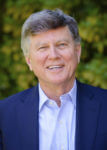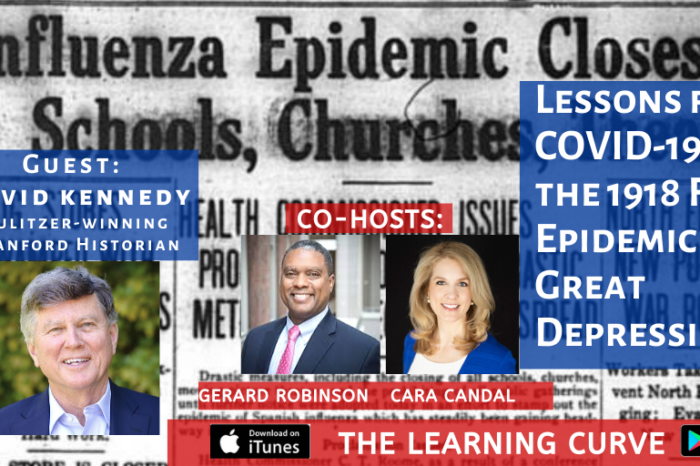Stanford Pulitzer Winner David Kennedy on Lessons for COVID-19 from the 1918 Flu Epidemic & Great Depression
/0 Comments/in COVID Podcasts, Featured, Podcast, rCOVID, US History /by Editorial StaffThis week on “The Learning Curve” Cara and Gerard continue coverage of COVID-19’s impact on K-12 education, joined by Pulitzer-winning historian David Kennedy, the Donald J. McLachlan Professor of History Emeritus at Stanford University. Professor Kennedy describes some of the distinguishing characteristics of the COVID-19 pandemic, compared to the 1918 flu and the Bubonic Plague in terms of rapidity, scale, mortality rate, and death toll. They also delve into differences, such as our society’s technological advancements, that help ease the disruption; governments’ data gathering capacity to fully understand the impact, and ability to mobilize; and the credibility of our leadership and institutions. They explore whether public health crises have received sufficient attention in K-12 history instruction, and what goes unreported in most accounts; and discuss the delicate balance between protecting civil liberties while avoiding the dangers of spreading misinformation.
Stories of the Week: The Florida Virtual School is gearing up to train teachers to deliver over 100 K-12 courses in mathematics, English language arts, history, science, electives, Advanced Placement, and career and technical education to 2.7 million students, at no cost, until June 30. A Gallup survey reveals that 42 percent of parents are concerned about COVID-19 school closures’ negative impact on their child’s education, and 11 percent are not using any educational resources to fill the instructional gap.
Newsmaker Interview Guest:
 David Kennedy is the Donald J. McLachlan Professor of History Emeritus at Stanford University. Professor Kennedy received the Dean’s Award for Distinguished Teaching in 1988. He is the current editor (since 1999) of the Oxford History of the United States series. Kennedy was awarded the Pulitzer Prize for History in 2000 for Freedom from Fear: The American People in Depression and War. His book Over Here: The First World War and American Society explored America’s political, economic, and domestic life during World War I. Kennedy received his B.A. in History from Stanford University and his M.A. and Ph.D. in American Studies from Yale University.
David Kennedy is the Donald J. McLachlan Professor of History Emeritus at Stanford University. Professor Kennedy received the Dean’s Award for Distinguished Teaching in 1988. He is the current editor (since 1999) of the Oxford History of the United States series. Kennedy was awarded the Pulitzer Prize for History in 2000 for Freedom from Fear: The American People in Depression and War. His book Over Here: The First World War and American Society explored America’s political, economic, and domestic life during World War I. Kennedy received his B.A. in History from Stanford University and his M.A. and Ph.D. in American Studies from Yale University.
Tweet of the Week:
Amid Dispute over Charter School Resolution, President of San Diego of NACCP Chapter Suspended by National Board
by @SDUTmcdonald #CharterSchools #SchoolChoicehttps://t.co/DgTNAegX5F
— Choice Media (@ChoiceMediatv) March 30, 2020
The next episode will air on April 10th with guest, Tim Keller, a Senior Attorney at Institute for Justice.
Newslinks
By May, nearly 3 million Florida K-12 students may be using state’s digital district curriculum | Florida | thecentersquare.com
42% of Parents Worry COVID-19 Will Affect Child’s Education
https://news.gallup.com/poll/305819/parents-worry-covid-affect-child-education.aspx
Get Updates on Our Education Research
Browse All Podcast Episodes:

Yale’s Pulitzer-Winning Prof. David Blight on Frederick Douglass, Slavery, & Emancipation

UVA Prof. E.D. Hirsch, Jr. on Core Knowledge, Equity, & Educating Citizens

Human Rights Advocate Kristina Arriaga on Cuba, Religious Liberty, & Cancel Culture

The Institute for Justice’s Michael Bindas on the SCOTUS, Carson v. Makin, & Expanding School Choice

Civil Rights Leader Bob Woodson on 1776 Unites & Race in America

Mariam Memarsadeghi on Freeing Iran, Civic Ed, & Immigrant Portraits

Independent Institute’s Dr. Morgan Hunter on Teaching Greco-Roman History to High Schoolers

Aurora Institute’s Susan Patrick on Digital Learning Lessons from COVID-19

Pulitzer Prize-Winning Prof. David Hackett Fischer on Paul Revere, George Washington, & American Independence

AEI’s Naomi Schaefer Riley on Parenting, Excessive Screen Time, & Religion in American Education

New York Times Best Seller Paul Reid on Winston Churchill, WWII, & the Cold War

Nina Rees on the 30th Anniversary of Charter Public Schools in America

Blended Learning Expert Heather Staker on Student-Centered Lessons During COVID-19

BU’s Dr. Farouk El-Baz on NASA’s Moon Landing, Remote Sensing, & STEM

Rafe Esquith on Teaching Shakespeare to Inner-City LA Students

Law Prof. Melvin Urofsky on Justice Louis Brandeis, the SCOTUS, & Dissenting Opinions

Heritage Foundation’s Jonathan Butcher on Edu Federalism, School Choice, Learning Pods

Georgetown’s Dr. Marguerite Roza on K-12 School Finance, Spending, & Results

Stanford’s National Humanities Medal Winner Prof. Arnold Rampersad on Langston Hughes & Ralph Ellison

The Washington Post’s Jay Mathews on An Optimist’s Guide to American Public Education

BBC Classics Prof. Bettany Hughes on Athenian Democracy, Socrates, & the Goddess Aphrodite

Dartmouth’s Prof. Susannah Heschel Discusses Rabbi Abraham Joshua Heschel & the Civil Rights Movement

Hoover Institution’s Dr. Eric Hanushek on COVID-19, K-12 Learning Loss, & Economic Impact

UK Classics Scholar Kathryn Tempest on Cicero, Brutus, & the Death of Caesar

Best-Selling, Netflix Author Loung Ung On Surviving Pol Pot’s Killing Fields

American Federation for Children’s Tommy Schultz on School Choice & Edu Federalism

Ayaan Hirsi Ali, International Best-Selling Author & Human Rights Activist




